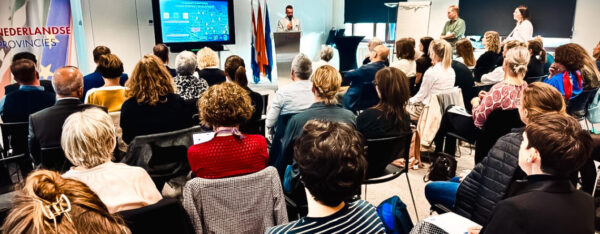
The 2025 Annual General Assembly of the EU STEM Coalition, held in Brussels on 5–6 November, marked a pivotal moment for the Hungarian STEAM platform and its parent institution, Obuda University. Delegates from across Europe gathered to evaluate progress, set future directions, and foster cross-border partnerships. During the event, Zoltán Márton, Director of the Hungarian STEAM Platform and head of its STEAM Office, presented Hungary’s recent achievements and outlined the national ecosystem’s collaborative framework. The presentation resonated with international experts and highlighted a strategy that integrates talent development, teacher education, research, and industry innovation.
EU STEM Coalition General Assembly: A Snapshot
Brussels served as the backdrop for a series of plenary sessions and research briefings that underscored three main themes:
- System‑level coordination – consistent with the Coalition’s mandate to harmonise policy and practice across member states.
- Inclusive talent pipelines – efforts to widen participation across socio‑economic and gender spectra.
- Industry‑education linkages – the launch of the Industry–Education Partnership Working Group focused on practical collaboration.
The Hungarian platform fit well within these themes, providing a ready‑made case study for how national actors can structure their initiatives into a unified policy stack.
Obuda University’s Strategic Vision for STEAM
The Five‑Year STEAM Strategy
Implemented in 2024 under the leadership of Director Zoltán Márton, the strategy sets out to embed STEAM principles across curriculum, research, and outreach. Key pillars include:
- Interdisciplinary courses that combine engineering, arts, and social sciences.
- Data‑driven assessment of learning outcomes.
- Funding mechanisms that encourage faculty collaboration across departments.
Teacher Training Initiatives
To ensure that classroom practice reflects the strategy, Obuda University launched a comprehensive teacher training programme:
- An accredited 30‑hour professional development module, available to secondary school teachers nationwide.
- A five‑day Summer Teacher Academy powered by the Royal Fund for Regional Development and Horizon Europe.
- International collaboration, such as a recent training session in Beijing jointly organised with a Chinese Experience Workshop.
Student‑Centred Programs
Two flagship programmes highlight the university’s commitment to student engagement:
- The STEAM Excellence Program calls secondary‑school students to apply for a scholarship that covers school‑to‑university transition.
- Children’s University Summer Camps now feature a broader portfolio, adding themes such as “Green City Development,” “Coding,” and “E‑sports.”
These offerings align with the EU’s push for experiential learning, enabling students from K‑12 to university to practice real‑world problem solving.
Impact on the International Stage
While the presentation was highly technical, its impact was felt beyond Budapest. Delegates from 16 countries acknowledged the Hungarian model as “well-structured,” “transparent,” and “inspiring.” Numerous partners expressed interest in:
- Hosting the next International STEAM Festival in Hungary.
- Co‑organising professional visits to Obuda’s research labs.
- Embedding Hungarian curricula into broader EU pilot projects.
This enthusiasm signals that Hungary’s approach will be a reference point for Central and Eastern European countries seeking to strengthen their own STEAM ecosystems.
Opportunities for Collaboration
The Assembly’s outcomes promise several avenues for stakeholders:
- Partnership‑Based Projects – Networked collaborations between universities, industry, and third‑sector organisations.
- Data‑Sharing Platforms – Initiatives such as CoVE STEM Europe will enable resource exchange across member states.
- Policy Alignment – Consistency with EU priorities on inclusive education, digital transformation, and sustainability.
For educators and programme directors, these pathways offer tangible means to deepen program quality, incorporate stakeholder feedback, and secure funding. For researchers and students, they unlock access to joint projects, conferences, and scholarships that cross national borders.
Next Steps for the Hungarian STEAM Platform
Obuda University will continue to build on its momentum by:
- Extending the STEAM Excellence Program to cover more high‑school cohorts.
- Evaluating the impact of teacher training on student outcomes using longitudinal data.
- Recruiting industry partners to co‑design competition challenges within the International STEAM Festival.
- Enhancing digital tools for edtech pilots, especially in the context of AI literacy and sustainability education.
Achieving these milestones will reinforce Hungary’s standing as a leader in STEM/STEAM education and secure further EU support.
Get Involved
Whether you are a teacher, administrator, or student, the new initiatives offer a range of opportunities to participate:
- Apply now for Obuda University’s STEAM Master’s Program and take the next step in your academic career.
- Register for the upcoming International STEAM Festival 2025 and showcase student projects.
- Schedule a consultation with the STEAM Office by clicking here.
- Share your experience or question in the article comments below for a community discussion.
- Explore our related articles to stay informed on the latest developments.
These actions will help you contribute meaningfully to the national STEAM agenda and leverage international collaborations that enhance learning outcomes.
Obuda University’s commitment to an integrated STEAM framework demonstrates how a coordinated effort can produce measurable progress. The 2025 Brussels Assembly amplified this message and set the stage for future partnership opportunities across Europe. Stakeholders are encouraged to act decisively and join the momentum that is reshaping STEM/STEAM education both locally and internationally.

